The latest Middle East archival collection to be catalogued differs slightly from recent projects in that the papers relate to the life and career of an academic rather than a diplomat or journalist.
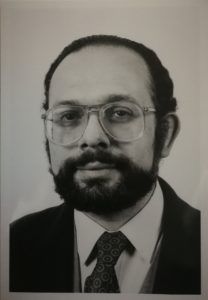
A portrait of Nazih Ayubi (1944-95) from the university archives. EUL UA/P/3g
Nazih Nassif Mikhail Ayubi (1944-95) was born on 22 December 1944 in Cairo and obtained a B.Sc. (1964) and M.Sc. (1968) in Political Science from Cairo University, where he was taught by Boutros Boutros-Ghali. He then came to England, studying for a Diploma in Public Administration at Manchester University (1970) followed by a D.Phil (Politics) at Oxford (1975). After returning to Cairo he worked as an assistant professor at the Institute of Public Administration and the National Institute for Management Development (1967-76), followed by a fellowship at the Al Ahram Center for Political and Strategic Studies, an independent research unit dedicated to regional and international affairs as well as Egyptian politics and society, with a particular emphasis on Arab-Israeli relations. Ayubi went on to hold posts at the American University in Cairo (AUC) as well as Cairo University, before accepting an appointment as Associate Professor at the University of California Los Angeles (UCLA) in 1979. After four years in America, he came to the University of Exeter in 1983, where he held the post of Reader in Politics and subsequently Director of the Middle East Programme.
This was an exciting time for Middle East research at Exeter: the Centre for Arab Gulf Studies had been founded in 1979 and the university was already assuming major significance for the quality of its resources and scholarship. Under Ayubi’s guidance, the Middle East programme became one of the most successful graduate programmes in Europe, with a stream of undergraduates and doctoral students benefitting from his expertise. His research interests included Egyptian politics, political economy, international relations and the international politics of Islam.
Nazih Ayubi was an incredibly prolific writer. While cataloguing his papers, I began compiling what I hoped would be a comprehensive bibliography of his published work – a task that remains unfinished and will take a considerable amount of time, given the sheer number of articles, book chapters and conference papers that he published during his career.
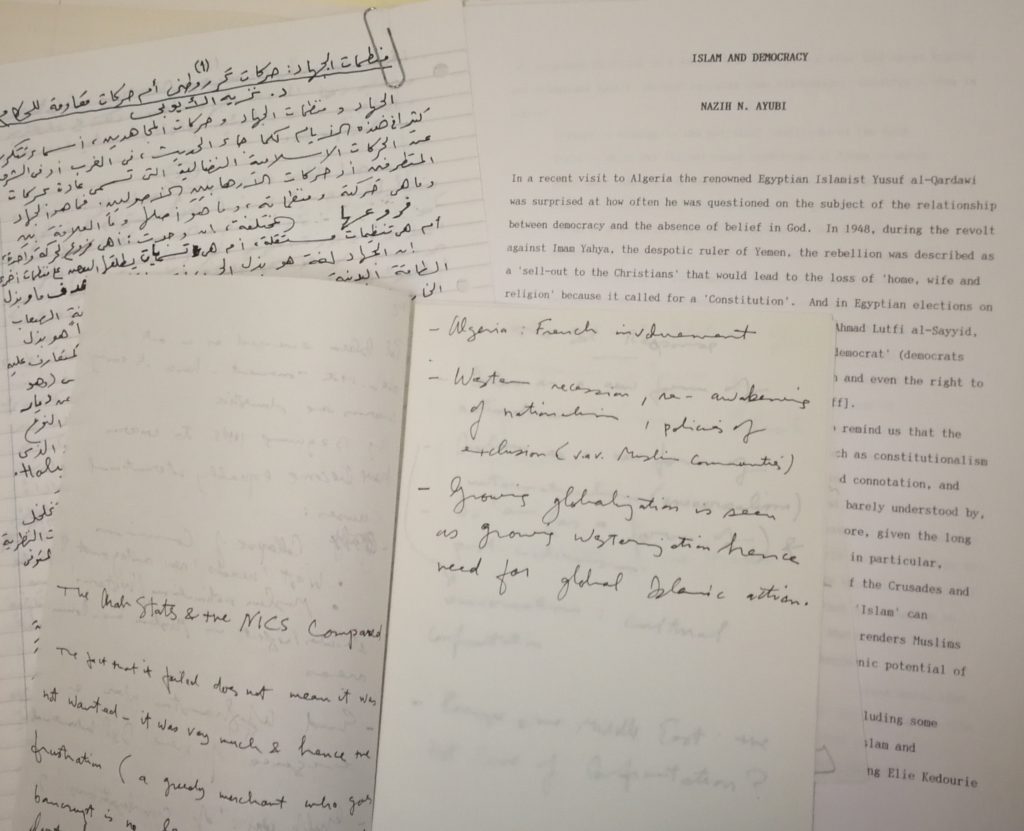
Some of Ayubi’s writings on the topic of ‘political Islam’ (EUL MS 129/1/1/3)
The Ayubi Papers
Ayubi’s papers are catalogued in four main categories: academic papers, conference papers, correspondence and research material. The academic papers include different versions of some of his published work, including early drafts of articles and book chapters, working notes and annotated proofs. There are also administrative documents relating to his academic career, both in America and at Exeter.
The conference materials relate to the numerous conferences and symposia attended by Ayubi during the 1980s and 1990s in places such as Paris, Leiden, New York, Istanbul, Marrakech, Rabat and Cairo, and include official conference materials and ephemera as well as copies of papers presented by Ayubi and other participants. Between 1991 and 1992 Ayubi held a Jean Monnet Fellowship at the European Institute in Florence, and our archive contains records of his academic activities during this time, including seminars, reading groups and conferences.
Ayubi was a highly-respected scholar who was continually being invited to speak at international conferences and collaborate in major scholarly projects; the correspondence preserved in our archive reflects the extent of his international reputation and the affection with which he was held. The correspondents read like a Who’s Who of Middle Eastern scholarship, with names such as Malcolm Kerr, Louis Cantori, Ray Hinnebusch, Albert Hourani, Roger Owen, Bernard Schaffer, Richard Sklar, Leonard Binder, P.J. Vatikiotis, Gerald Caiden and Boutros Boutros Ghali. The letters typically deal with professional matters such as collaborating on books or taking part in conferences, or seeking job opportunities, but they are often warm and personal too, with correspondents exchanging news about family and children, expressing how much they are looking forward to meeting up or urging Ayubi to come and visit. These informal letters sometimes provide intriguing insights into events taking place in the Middle East, such as the political implications of academic appointments in Beirut or Cairo, and there are continual reminders of the thin veil separating politics from scholarship in the region.
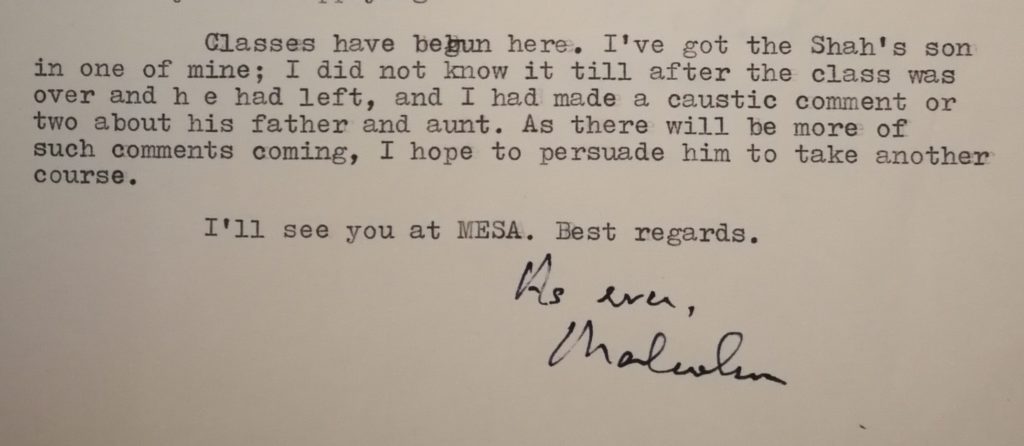
Part of a letter from Malcolm Kerr to Ayubi (EUL MS 129/5/6) illustrating the difficulties in separating politics from academia. Kerr left Cairo in September 1982 when he was appointed President of the American University in Beirut, where he had been born and raised. He was assassinated by gunmen on campus in January 1984.
Ayubi’s research materials include a small fraction of some of the vast primary and secondary literature he gathered while writing his books. Anyone who has read Ayubi’s work will be aware of the extensive scope of his reading, which included official government records as well as Arab writers who were less well-known in the west. The Ayubi archive does not include the published books and periodicals that he gathered for research purposes – these form a separate donation to the library, some of which is still to be catalogued – but it does include a large mass of annotated material, such as photocopied documents and periodical literature, presscuttings and typescripts. Many of these have been grouped together into folders arranged by subject and contain notes by Ayubi, offering insights into his working methods as well as access to the sources he used in his research.
To give some idea of the extent of Ayubi’s work and the potential for using his papers for future research, I want to highlight three main themes:
Political Islam
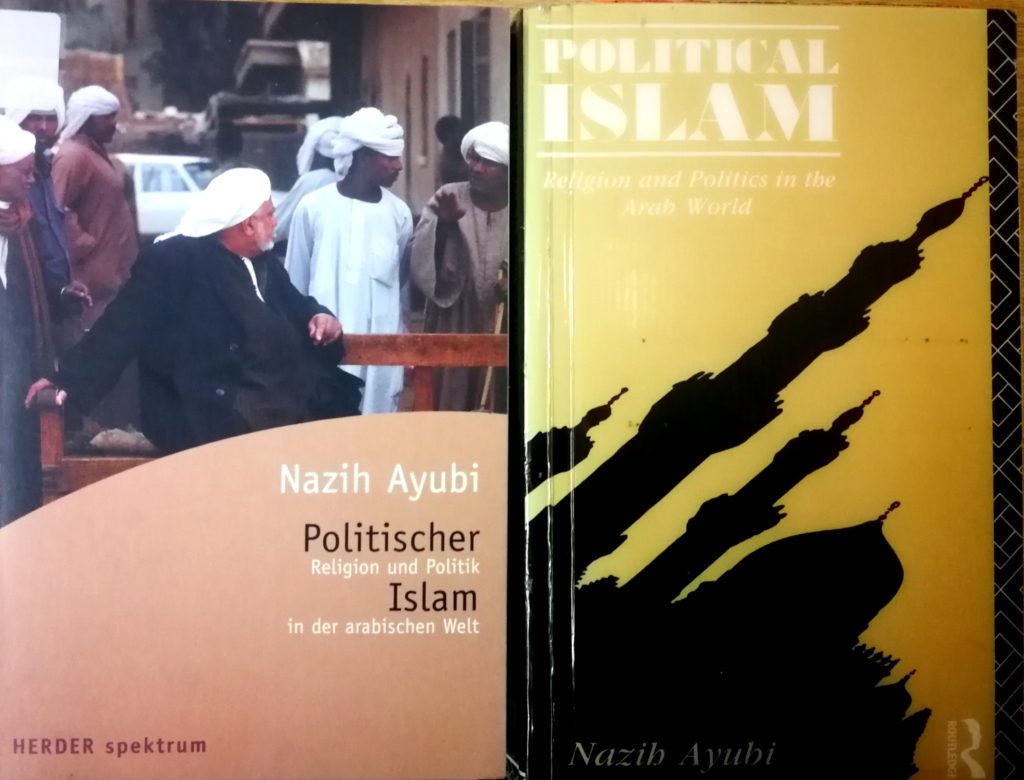
The international significance of Ayubi’s work is indicated by the numerous languages into which his books were translated, including French, German, Italian and Japanese
In his Political Islam: religion and politics in the Arab World (London: Routledge, 1991) – which was written between 1988 and 1989 – Ayubi argued that, contrary to the claims of Islamists that the early political systems were shaped and formed by Islamic doctrine, historical analysis suggests the opposite: political regimes appropriated Islam for their own ends as a way of legitimising their rule. To counter Islamic fundamentalists who insist that they are trying to reinstate a golden age of Islam; Ayubi demonstrated persuasively that notions of Islam as a political religion are relatively new, and can only be traced back to the interwar period.
Ayubi’s thinking on this topic can be traced through various stages from papers in the archive, including his notes on ‘Islam and Democracy’ (EUL MS 129/1/1/3), early manuscript drafts for his articles on ‘Islamic State’ and ‘The Muslim Brotherhood’ (overview article), written for The Oxford Encyclopedia of the Modern Islamic World (EUL MS 129/1/1/7), his annotated proofs for Political Islam: religion and politics in the Arab World (EUL MS 129/1/1/13), and various research notes he made on Islamic communities, the notion of أمة (‘ummah’), the relationship between militant movements and the history of Islamic jurisprudence (EUL MS 129/1/2/2 and 1/2/4 and 1/2/7).
Ayubi would have had much to say about the Islamist resurgence that has taken place since his death, and his papers could provide an interesting perspective from which to undertake further lines of research.
Europe
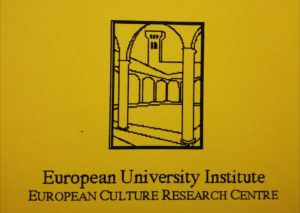
EUL MS 129/4/2
Although much of Ayubi’s work focussed on the Middle East, he held a Jean Monnet Fellowship at the European Institute in Florence (1991-92) and devoted much thought to relations between Europe and its Arab neighbours. He edited the essay collection Distant neighbours: the political economy of relations between Europe and the Middle East (Ithaca, 1995), from papers originally delivered at the European Institute in March 1993, contributing the opening chapter on ‘Farms, factories…and walls: which way for European/Middle Eastern Relations?’ He later took part in the 1995 ‘Euromed’ conference (EUL MS 129/3/21) that gave rise to the Euro-Mediterranean Partnership. Such attempts to strengthen and articulate relationships between Europe and its neighbours in North Africa and the Middle East were in part a response to claims of a ‘clash of civilizations’ that had arisen in reaction to Islamist resurgence detailed above. The future and form of these relations remains acutely relevant, as debates over ‘Brexit’ and immigration from the Middle East into Europe have encouraged closer scrutiny of the identities and boundaries used to define these relationships. Researchers seeking to explore this topic could begin their work using some of the papers compiled by Ayubi during his European study fellowships (EUL MS 129/4), at Euromed and other related conferences (e.g. EUL MS 129/3/7).
The Arab State
Ayubi’s work was rooted in the close links between public administration and political theory and throughout his career he retained an interest in the workings of the civil service, the military and the bureaucratic systems that support the functioning of the state. In contrast to a well-established tradition, as expressed by Karl Wittfogel’s Oriental Despotism (1957) that insists that Middle Eastern states are strong while civil society is weak, Ayubi drew a nuanced distinction between ‘hard’ and ‘strong’ states. A ‘hard state’ is one that uses its powers – bureaucratic administration, surveillance, the military and police forces – to coerce and punish its citizens, because it is unable to achieve its objectives by using democratic persuasion, economic incentives and the flexibility that is characteristic of a truly ‘strong state’. By challenging the confusion – typical of a long strand of western analysis of the Arab world – between oppressive power and moral strength, Ayubi’s work opens up a fascinating debate about the potential for, and possible means of, future change in the region. It would be interesting to return to Ayubi’s arguments and reassess them in the light of the ‘Arab Spring’ and its aftermath. There is ample scope too for linking all three of the above themes – for example, in exploring the success of political Islamists in ‘state-building’ in Arab regions where the state has proved weak, or European difficulties in providing a coherent economic or political response to the power struggles between authoritarian states and a diverse array of democratic and Islamist challengers.
Nazih Ayubi’s sudden death from a heart attack at the age of 50 was a tragic loss, both for his family and colleagues as well as for the world of Middle East scholarship. The bequest of his papers, however, allows students and researchers access to the materials and processes that shaped his publications and will hopefully inspire others to engage with his writings and build upon his pioneering work. The online catalogue of Ayubi’s papers can be explored here.
Thank you for this great work. Ayubi was )and still) one of the best modern Arab Political Scientists and thinkers ever. I was wondering if you have his books, Arabic or English available to share with us?
Many thanks for your kind comment. I am gratified to learn you share my admiration for Ayubi’s work; although research has moved on in some of the areas he studied, the range, depth and detail of his analysis remains unsurpassed, and the extent of his archive reveals the staggering amount that he managed to write within his tragically short career. We have well over a dozen of his books and pamphlets in our library collections, but these are unfortunately closed just now because of the current health situation. Two are available electronically. If there is a particular book by Ayubi that you would like to see featured in more detail, do let us know, and I can try and do a more detailed blogpost on it when normal service is resumed.
Dear James, thank you for the reply, and sorry for my late response I am happy that there are people like us still interested in honoring Ayubi’s legacy. In fact I am working on revisiting his work on Arab States on my Ph.D. Here in University of St Andrews (not that far from Extester ) and unfortunately I can’t find many of his work (especially the old one in Arabic) hopefully when life come back to normal we can meet and talk about his work and how to push it forward. Thank you again for your message and efforts Take care and seat safe
So I discovered this by accident, the subject of the article was my father, unfortunately his glittering career cut short by what have could been easily avoided had the NHS unfortunately not failed him.
Being a top level academic in his field wasn’t enough, relatively few people knew he was an expert pigeon geneticist, what started out as a ‘grow your own food’ subsistence crop making best use of a Cairo rooftop became his second passion after academia, he was published in several journals and periodicals as he turned his great brain to recreating a long-forgotten French breed (the Cauchois) which required hunting all over Europe for suitable genetic stock, crossing and back crossing with other varieties and visiting pigeon shows all over the UK. I have fond memories of being dragged up to Doncaster as a small kid to visit pigeon shows where dad would network with other fanciers, in those days he’d probably have been the most obviously ethnic person in the room. He did sometimes sport a flat cap to help fit in!
He was also a very hospitable person, a big foodie (legendary bbqs!) and a huge lover of music, particularly classic Arabic and Egyptian.
If there’s anything I can do to help with your efforts to continue my father’s work and keep his academic legacy alive, please feel free to get in touch.